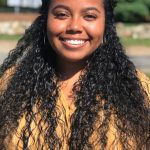“For parents trying to help their kids with homework in this new era of online learning, solving math problems may be among your more worrisome tasks,” says Tutita Casa, an associate professor of curriculum and instruction at the Neag School of Education. “There are, perhaps, two equations that many parents can agree on: Home ≠ school, and parents ≠ teachers.”
WDIV (Neag School alumnus and Lions general manager Bob Quinn is interviewed about the draft and maintaining work-life balance)
WNPR – audio 5:53 (Jennie Weiner is interviewed about the challenges of parenting and working online during the pandemic)
Tara Amatrudo has been hired as the new principal at Marine Science Magnet High School in Groton. Amatrudo earned her undergraduate and master’s degrees from Southern Connecticut State University and her Sixth Year Professional diploma at the University of Connecticut.
With the recent transition from educating in the classroom to the virtual realm due to the pandemic, the teaching world has changed drastically. We wanted to hear from Neag School alumni now serving as teachers about how they are managing the online teaching and learning environment.
“Sport went from being kind of like a safe haven [for me] to something that transformed into something that I really value, but really wanted to pour into others,” Batouly Camara said. “I understood what it did for me at a young age, and I’m still forming what it means to me now. But I know that it’s a huge part of everything that I do and everything I want to do in the future.”
“I am proposing … that we need to adopt a different approach to school and curriculum during the three or four months this lasts,” says Elena Sada, a doctoral student in curriculum and instruction at the Neag School.
“As parents and other guardians get ready to prepare their teens for college, they should not neglect helping those new college students in terms of their overall well-being. Well-being is influenced by lots of factors, so an important part of supporting your wellness is to create a personal plan of action,” says Sandra Chafouleas a professor of Educational Psychology at the Neag School of Education.
“There are more immediate budget concerns on the front burner, because education and distance learning and planning for the next fiscal year are probably on the horizon,” Bob Villanova said. “The immediate push is making sure that educational opportunity and moving ahead are real to every student.”
“I will forever be grateful that I chose this prestigious institution to shape me into the educator I am today.”


